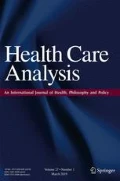Abstract
Various debates in bioethics have been focused on whether non-persons, such as marginal humans or non-human animals, deserve respectful treatment. It has been argued that, where we cannot agree on whether these individuals have moral status, we might agree that they have symbolic value and ascribe to them moral value in virtue of their symbolic significance. In the paper I resist the suggestion that symbolic value is relevant to ethical disputes in which the respect for individuals with no intrinsic moral value is in conflict with the interests of individuals with intrinsic moral value. I then turn to moral status and discuss the suitability of personhood as a criterion. There some desiderata for a criterion for moral status: it should be applicable on the basis of our current scientific knowledge; it should have a solid ethical justification; and it should be in line with some of our moral intuitions and social practices. Although it highlights an important connection between the possession of some psychological properties and eligibility for moral status, the criterion of personhood does not meet the desiderata above. I suggest that all intentional systems should be credited with moral status in virtue of having preferences and interests that are relevant to their well-being.
Similar content being viewed by others
References
Bateson P (1991) Assessment of pain in animals. Anim Behav 42:827–839
Bayne T (2001) Moral status and the treatment of dissociative identity disorder. J Med Philos 27(1):87–105
Beauchamp T (1999) The failure of theories of personhood. Kennedy Inst Ethic 9(4):309–324
Bortolotti L, Harris J (2006) Embryos and eagles: symbolic value in research and reproduction. Camb Q Healthc Ethic 15(1):22–34
Mameli M, Bortolotti L (2006) Animal rights, animal minds, and human mindreading. J Med Ethic 32:84–89
Regan T (1983) The case for animal rights. University of California Press
Singer P (1989) All animals are equal. In: Regan T, Singer P (eds) Animal rights and human obligations. Prentice Hall, Englewood Cliffs, NJ
Steinbock B (1996) Life before Birth. Oxford University Press, New York
Sterelny K (2003) Thought in a hostile world. Blackwell, Oxford
Acknowledgements
This paper was presented at a conference entitled “Bioethics: Past, Present and Future” that took place at the University of Birmingham (UK) in June 2006. I am grateful to Jon Ives for inviting me to be a speaker at the conference and to the audience for a very stimulating discussion. In the preparation of the written version of this paper, I acknowledge the stimulus and support of the EURECA project on delimiting the research concept and the research activities, sponsored by the European Commission, DG-Research, as part of the Science and Society Research Program — 6th Framework.
Author information
Authors and Affiliations
Corresponding author
Rights and permissions
About this article
Cite this article
Bortolotti, L. Disputes Over Moral Status: Philosophy and Science in the Future of Bioethics. Health Care Anal 15, 153–158 (2007). https://doi.org/10.1007/s10728-006-0031-7
Published:
Issue Date:
DOI: https://doi.org/10.1007/s10728-006-0031-7



